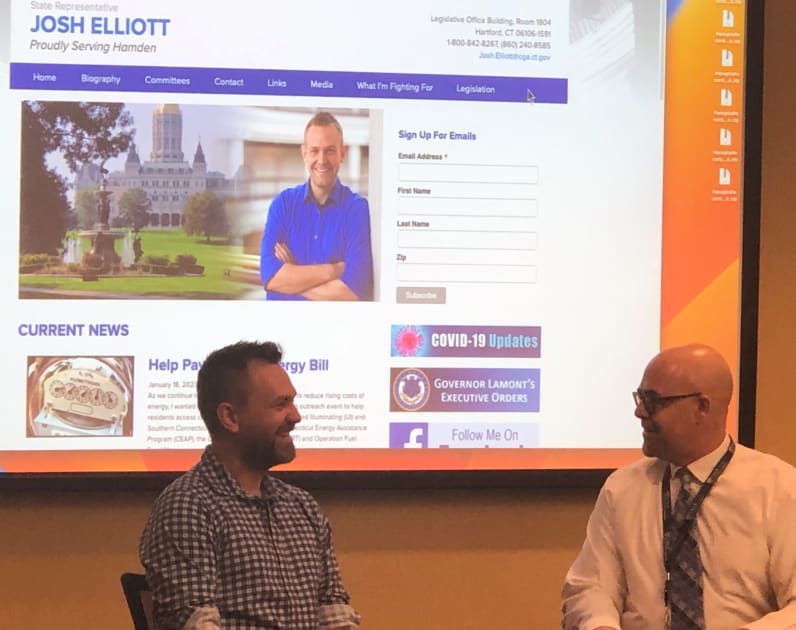Legislative Advocacy Promoted in PA Program Conversation With State Representative < Yale School of Medicine
For some health professionals, caring for patients and the larger world of health care policy are seemingly separate things, with one having little discernible bearing on the other. But for others, including two public health advocates associated with the Yale School of Medicine (YSM) Physician Associate (PA) Program, they are intertwined, and students and clinicians should educate themselves about the connections.
“I think we often say ‘policy/politics/advocacy’ and health care students start to run away,” says Ana Eliza Souza Cunha, a student in the PA Program. “But in reality, there are many parallels between these two worlds, and introducing students to this field sooner will benefit them to be strong and confident leaders.”
PA Program Assistant Professor Jonathan Weber, MA, PA-C, DFAAPA, who served as the Connecticut Academy of PAs (ConnAPA) legislative chair from 2008-2018, agrees that it is important for PAs to engage in policy and advocacy. “Effective advocacy is one way for clinicians to ‘walk the talk.’ By taking the lead on policy efforts or joining forces with other stakeholders, we can move the needle in many ways—improving access to care, decreasing the impact of societal determinants of health, and reducing health disparities.”
Exposing PA students to how state policy works
With Souza Cunha spearheading the effort, she and Weber collaborated to host an event on February 22 with State Representative Josh Elliott (88th District/Hamden)—who among other roles serves on the legislature’s public health committee—to expose YSM PA students to how state-level policy works. It was structured as a conversation between Weber and Elliott, with time at the end for audience questions. Most YSM PA students, as well as PA Program faculty and staff, Yale Physician Assistant Online students, ConnAPA leadership, legislative committee members, and legislative consultants attended, both in person and virtually.
The event was the second of a three-part series, Learn how to be a PA Advocate and bring change to your community!, which Souza Cunha organized as a project for her Physician Assistant Educators Association student health policy fellowship. Souza Cunha also is an American Academy of Physician Assistants (AAPA) student academy representative and an AAPA House Delegate. Weber praised Souza Cunha’s work on the series, “I’ve been impressed with Ana Eliza’s leadership on this advocacy series. Her effort to further energize her already enthusiastic classmates with this one-on-one session with Representative Elliott was topnotch.” (Jason Prevelige, PA-C, the current ConnAPA legislative chair, participated in Souza Cunha’s three-part series, though he was not part of the conversation with Elliott.)
During the engaging and transparent discussion, Elliott emphasized the importance of relationship building in the legislative process, including not burning bridges just because you disagree with someone on an issue, because you may be aligned with them and need their support on another bill. Elliott’s remarks about relationship building were one example of the parallels Souza Cunha sees between policy/advocacy and health care. Another is how change on the policy level can be slow, with Elliott describing how he has spent years working on aid-in-dying legislation. Pointing to her work with patients, Souza Cunha says, “We don’t change their minds to do better for themselves overnight, and we don’t admonish them or make an enemy of our patients when they disagree with us. Like Representative Elliott said, the only thing that matters is the relationship that you build.”
Weber also pointed to the parallels between advocacy and health care. In discussing the abundant misinformation during the debate around the elimination of the religious exemption for vaccinations, Elliott said that rather than try to address misinformation on a broad scale, which would be impossible, he focuses on convincing those he needs to convince as part of the process to get legislation passed. Responding to Elliott’s remarks, Weber analogized to the role of health care providers convincing one patient at a time about a particular health-related issue.
Far-reaching, long-term positive impacts
Toward the end of the session, Weber asked Elliott to share advice with the PA students. Elliott responded, “Be thoughtful. Be caring,” and also encouraged them to get involved politically. If you are passionate about something, Elliott told them, you can have a meaningful impact, which affects many people, complementing your work helping individual patients. Weber echoed this point. “The session reaffirmed my belief that clinicians have a duty to provide policymakers with the factual information they need to make decisions,” he said. “Our involvement with leaders like Representative Elliott can have far-reaching and long-term positive impacts on the public’s health.”
One reason Souza Cunha initiated this series “was to start peaking student interest in advocacy and leadership.” Because health care students engage in relationship building in clinical practice all the time, Souza Cunha hopes that “by realizing that it’s a skill we are comfortable utilizing daily, students will be inspired to build relationships with individuals within governing bodies, like Representative Elliott, so that we can continue to guarantee that future PAs can provide quality care to our future patients.”
The advocacy session “met the mark in my book,” says Weber, noting “every student with whom I chatted afterwards spoke with a new sense of purpose and resolve to get involved.” Weber expressed his gratitude for Elliott’s willingness to engage students, and also for his work with ConnAPA to increase access to care, decrease the impact of societal determinants of health, and reduce health disparities for Connecticut residents.













